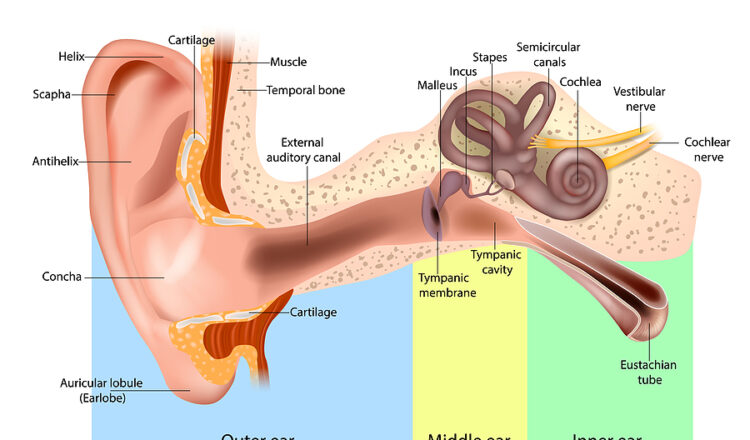Millions of individuals throughout the world suffer from tinnitus, a common illness that is commonly described as a ringing, buzzing, or hissing sound in the ears. Its effects on people can range from a little nuisance to a severe disturbance of everyday life, and they can be either brief or chronic. In this post, we’ll examine natural support choices for treating tinnitus as well as its causes and symptoms.
Understanding Tinnitus
Tinnitus is a symptom, not a sickness, of a deeper problem. It happens when there is an impression of sound, even if there is no external sound source. It may sound like ringing, clicking, humming, or buzzing, among other things. Tinnitus, which can be continuous or intermittent, may affect one or both ears.
Common Causes of Tinnitus
- Exposure to Loud Noise: Prolonged exposure to high-intensity noise levels, which are frequently present in settings like boisterous sporting events or workplaces full of clamorous machinery, poses a serious threat to the delicate hair cells nestled within the inner ear. These complex hair cells may suffer damage over time as a result of this constant auditory assault, which could lead to the emergence of tinnitus. The constant presence of ringing or buzzing in the ears is the defining feature of this painful auditory disease.
- Age-Related Hearing Loss: Presbycusis, the medical term for age-related hearing loss, frequently coexists with the development of tinnitus. The intricate auditory system of the human ear ages naturally over time, which results in this condition. As people move through different periods of life, the intricate anatomical structure in the inner ear changes gradually and unavoidably throughout time. These alterations may have a major impact on auditory perception, ultimately resulting in the co-occurrence of tinnitus and age-related hearing loss.
- Earwax Blockage: An accumulation of earwax, or cerumen, can obstruct the ear canal and cause the onset of tinnitus symptoms. The main job of earwax, a substance that the body naturally produces, is to shield the ear canal and eardrum from outside invaders like dust, dirt, and bacteria. However, earwax can build up and harden when production exceeds the body’s normal processes for outflow, leading to a physical obstruction inside the ear canal. This block not only prevents sound waves from moving but could also make it easier to hear tinnitus.
Sound waves cannot reach the sensitive inner ear structures when earwax is in the way. Sound reflections and the resulting changes in the auditory pathway can lead to tinnitus, a disorder where people hear ringing, buzzing, or humming in their ears even when there are no external sounds.
- Medical Conditions: Numerous medical illnesses have been recognized as potential tinnitus triggers, including vascular problems, TMJ disorders, and high blood pressure. These ailments show the complex interrelationship between general health and auditory function, emphasizing the various medical diseases that may affect the auditory system and perhaps cause or aggravate tinnitus symptoms.
- Drugs: Tinnitus can be a side effect of some drugs, especially those with ototoxic effects. Ototoxic substances have the ability to damage the sensitive inner ear structures or disrupt auditory pathways, resulting in the feeling of tinnitus. Healthcare professionals must take into account the possible toxicity of pharmaceuticals when administering them and monitor patients for auditory symptoms such as tinnitus while taking these treatments.
Tinnitus Symptoms
Tinnitus symptoms can vary from person to person. Common experiences include:
- Persistent ringing, buzzing, or humming sounds in the ears.
- Difficulty concentrating or sleeping due to the noise.
- Increased stress, anxiety, or frustration.
- Impaired hearing, particularly in noisy environments.
Natural Support Options for Tinnitus
While there is no cure for tinnitus, several natural strategies can help manage its symptoms:
- Sound Therapy: White noise or relaxing noises can be used to mask the tinnitus noise, offering comfort. White noise generators, natural sounds, or even a basic fan can do this.
- Stress Management: Stress can exacerbate tinnitus symptoms. Practices like meditation, yoga, and deep breathing exercises can help reduce stress and improve overall well-being.
- Dietary Adjustments: Some people discover that limiting their diet of sodium, caffeine, and alcohol helps to reduce the symptoms of tinnitus. A healthy diet full of antioxidants may also benefit ear health.
- Earwax Removal: If earwax blockage is a contributing factor, consult a healthcare professional for safe earwax removal.
- Avoid Loud Noises: Protect your ears from further damage by wearing earplugs or noise-canceling headphones in noisy environments.
- Supplements: Some supplements, like magnesium, zinc, and ginkgo biloba, have been studied for their potential to reduce tinnitus symptoms. Consult with a healthcare provider before taking any supplements.
Conclusion
Tinnitus can have a big influence on your daily life and is frequently difficult to deal with. However, you can lessen its disruptive effects by using the appropriate tactics and assistance. Consulting a healthcare professional is essential if you have tinnitus. In order to help you properly manage your symptoms, they can perform a thorough evaluation of your situation and offer specific advice.
It’s crucial to remember that natural support techniques that are complementary, like SonoVive, can complement conventional therapy and improve the overall management of tinnitus. These organic methods might enhance the quality of life for people who struggle with tinnitus-related persistent noises.
You can gain the power to manage your tinnitus, lessen its effects, and strive toward a more comfortable and peaceful daily life by speaking with a healthcare provider and investigating natural support solutions like SonoVive.



